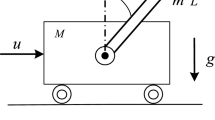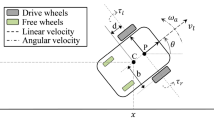Abstract
The quadrotor has many potential applications such as infrastructure predictive maintenance in mining tunnels of the railway. In order to navigate through those environments by using the quadrotor drone, there are many challenges such as aerodynamics disturbances, parametric uncertainties, and noise measurements. A robust adaptive global time-varying sliding-mode controller (RAGTVSMC) is proposed to address the quadrotor path in the presence of the random disturbances and uncertainties. In order to eliminate the reaching phase and reduce the initial control effort, a novel time-varying sliding mode (TVSM) surface is presented for the quadrotor system. Moreover, the TVSM surface is designed to meet the impact time requirement with a global sliding mode. Adaptive laws are developed to address the upper bound of the additives disturbances on the quadrotor dynamics using only the error position and velocity. The convergence with specific time is assured and the quadrotor stability is proved according to Lyapunov’s theory. Finally, to demonstrate the effectiveness of the proposed controller in this work, simulations are conducted.
Similar content being viewed by others
References
M. Hassanalian and A. Abdelkefi, “Classifications, applications, and design challenges of drones: A review,” Progress in Aerospace Sciences, vol. 91, pp. 99–131, 2017.
C. Kanellakis and G. Nikolakopoulos, “Survey on computer vision for UAVs: Current developments and trends,” Journal of Intelligent & Robotic Systems, vol. 87, pp. 141–168, 2017.
C. Wang, B. Song, and P. Huan, “Trajectory tracking control for quadrotor robot subject to payload variation and wind gust disturbance,” Journal of Intelligent & Robotic Systems, 2016.
J. Liu, W. Gai, J. Zhang, and Y. Li, “Nonlinear adaptive backstepping with ESO for the quadrotor trajectory tracking control in the multiple sisturbances,” Int. J. Control. Autom. Syst., vol. 17, pp. 2754–2768, 2019.
M. Labbadi and M. Cherkaoui, “Novel robust super twisting integral sliding mode controller for a quadrotor under external disturbances,” Int. J. Dyn. Control., 2019.
L. Qian and H. H. T. Liu, “Path-following control of a quadrotor UAV with a cable-suspended payload under wind disturbances,” IEEE Trans. Ind. Electron., vol. 67, pp. 2021–2029, 2020.
M. Labbadi and M. Cherkaoui, “Robust adaptive backstepping fast terminal sliding mode controller for uncertain quadrotor UAV,” Aerosp. Sci. Technol., vol. 93, 105–306, 2019.
O. Mofid and S. Mobayen, “Adaptive sliding mode control for finite-time stability of quad-rotor UAVs with parametric uncertainties,” ISA Transactions, vol. 72, pp. 1–14, 2018.
M. Labbadi and Cherkaoui, “Robust adaptive nonsingular fast terminal sliding-mode tracking control for an uncertain quadrotor UAV subjected to disturbances,” ISA Trans., 2019.
H. Rios, R. Falcon, O. A. Gonzalez, and A. Dzul, “Continuous sliding-mode control strategies for quadrotor robust tracking: Real-time application,” IEEE Trans. Ind. Electron., vol. 66, pp. 1264–1272, 2019.
F. Oliva-Palomo, A. J. Munoz-Vazquez, A. Sanchez-Orta, V. Parra-Vega, C. Izaguirre-Espinosa, and P. Castillo, “A fractional nonlinear PI-structure control for robust attitude tracking of quadrotors,” IEEE Trans. Aerosp. Electron. Syst., vol. 9251, pp. 1–10, 2019.
S. Yang and B. Xian, “Energy-based nonlinear adaptive control design for the quadrotor UAV system with a suspended payload,” IEEE Trans. Ind. Electron., vol. 67, pp. 2054–2064, 2020.
M. Labbadi and M. Cherkaoui, “Robust integral terminal sliding mode control for quadrotor UAV with external disturbances,” Int. J. Aerosp. Eng., vol. 2019, Atricle ID 2016416, 2019.
S. Mobayen and D. Baleanu, “Stability analysis and controller design for the performance improvement of disturbed nonlinear systems using adaptive global sliding mode control approach,” Nonlinear Dyn., vol. 83, pp. 1557–1565, 2016.
M. Boukattaya, H. Gassara, and T. Damak, “A global time-varying sliding-mode control for the tracking problem of uncertain dynamical systems,” ISA Trans., vo. 97, pp. 155–170, 2019.
S. Ullah, A. Mehmood, Q. Khan, S. Rehman, and J. Iqbal, “Robust integral sliding mode control design for stability enhancement of under-actuated quadcopter,” International Journal of Control, Automation and Systems, vol. 18, pp. 1671–1678, 2020.
G. Flores, “Output feedback control for a quadrotor aircraft using an adaptive high gain observer,” International Journal of Control, Automation and Systems, vol. 18, pp. 1–13, 2020.
M. Labbadi, S. Nassiri, L. Bousselamti, M. Bahij, and M. Cherkaoui, “Fractional-order fast terminal sliding mode control of uncertain quadrotor UAV with time-varying disturbances,” Proc. of 8th Int. Conf. Syst. Control. ICSC 2019, pp. 417–422., 2019
B. Tian, J. Cui, H. Lu, Z. Zuo, and Q. Zong, “Adaptive finite-time attitude tracking of quadrotors with experiments and comparisons,” IEEE Trans. Ind. Electron., vol. 66, pp. 9428–9438, 2020.
K. Eliker and W. Zhang, “Finite-time adaptive integral backstepping fast terminal sliding mode control application on quadrotor UAV,” Int. J. Control. Autom. Syst., vol. 17, pp. 1–16, 2019.
M. Islam, M. Okasha, and E. Sulaeman, “A model predictive control (MPC) approach on unit quaternion orientation based quadrotor for trajectory tracking,” Int. J. Control. Autom. Syst., vol. 17, pp. 2819–2832, 2019.
D. Cabecinhas, R. Cunha, and C. Silvestre, “A trajectory tracking control law for a quadrotor with slung load,” Automatica, vol. 106, pp. 384–389, 2019.
C. D. McKinnon and A. P. Schoellig, “Estimating and reacting to forces and torques resulting from common aerodynamic disturbances acting on quadrotors,” Rob. Auton. Syst., vol. 123, 103314, 2020.
Z. Zhao, C. K. Ahn, and H.-X. Li, “Boundary antidisturbance control of a spatially nonlinear flexible string system,” IEEE Transactions on Industrial Electronics, vol. 67, no. 6, pp. 4846–4856, Jun. 2020.
Z. Zhao, C. K. Ahn, and H.-X. Li, “Dead zone compensation and adaptive vibration control of uncertain spatial flexible riser systems,” IEEE/ASME Transactions on Mechatronics, vol. 25, no. 3, pp. 1398–1408, Jun. 2020.
Z. Liu, X. He, Z. Zhao, C. K. Ahn, and H.-X. Li, “Vibration control for spatial aerial refueling hoses with bounded actuators,” IEEE Transactions on Industrial Electronics, pp. 1–1, 2020.
J. M. Vazquez-Nicolas, E. Zamora, I. Gonzalez-Hernandez, R. Lozano, and H. Sossa, “PD+SMC quadrotor control for altitude and crack recognition using deep learning,” Int. J. Control. Autom. Syst., vol. 18, pp. 834–844, 2020.
X. Chen, T. Huang, J. Cao, J. H. Park, and J. Qiu, “Finite-time multi-switching sliding mode synchronisation for multiple uncertain complex chaotic systems with network transmission mode,” IET Control Theory & Applications, vol. 13, no. 9, pp. 1246–1257, Jun. 2019.
X. Chen, J. Cao, J. H. Park, T. Huang, and J. Qiu, “Finite-time multi-switching synchronization behavior for multiple chaotic systems with network transmission mode,” Journal of the Franklin Institute, vol. 355, no. 5, pp. 2892–2911, Mar. 2018.
X. Chen, J. Cao, J. H. Park, G. Zong, and J. Qiu, “Finite-time complex function synchronization of multiple complex-variable chaotic systems with network transmission and combination mode,” Journal of Vibration and Control, vol. 24, no. 22, pp. 5461–5471, Jan. 2018.
Y. Liu, X. Liu, Y. Jing, X. Chen, and J. Qiu, “Direct adaptive preassigned finite-time control with time-delay and quantized input using neural network,” IEEE Transactions on Neural Networks and Learning Systems, vol. 31, no. 4, pp. 1222–1231, Apr. 2020.
P. Lin, J. Ma, and Z. Zheng, “Robust adaptive sliding mode control for uncertain nonlinear MIMO system with guaranteed steady state tracking error bounds,” Journal of the Franklin Institute, vol. 353, pp. 303–321, 2016.
M. Zhihong and X. Yu, “Adaptive terminal sliding mode tracking control for rigid robotic manipulators with uncertain dynamics,” JSME International Journal Series C Mechanical Systems, Machine Elements and Manufacturing, vol. 40, pp. 493–502, 1997.
J.-J. Xiong and E.-H. Zheng, “Position and attitude tracking control for a quadrotor UAV,” ISA Transactions, vol. 53, no. 3, pp. 725–731, May 2014.
F. Chen, R. Jiang, K. Zhang, B. Jiang, and G. Tao, “Robust backstepping sliding mode control and observer-based fault estimation for a quadrotor UAV,” IEEE Trans Ind Electron, vol. 63, pp. 5044–5056, 2016.
Author information
Authors and Affiliations
Corresponding author
Additional information
Publisher’s Note Springer Nature remains neutral with regard to jurisdictional claims in published maps and institutional affiliations.
Moussa Labbadi received his M.S. degrees in Mechatronic from University Abdelmalek Essaadi of Tetouan, Morocco, in 2017. He received his Ph.D. degree at the Engineering for Smart and Sustainable Systems Research Center (E3S) of Mohammadia School of Engineers, Mohammed V University in Rabat, Morocco. His research interests include robotics, aerial robotics (quadrotor UAV drones), mechatronics (motion control smart machines), estimation, nonlinear control, fractional-order sliding mode control and aerospace vehicles.
Mohamed Cherkaoui received his state engineer degree in electrical engineering from the Mohammadia School of Engineers, Mohammed V University, Rabat, Morocco, in 1979 and his M.Sc.A. and Ph.D. degrees from the National Polytechnique Institute of Lorraine, Nancy, France, in 1983 and 1990, respectively, all in Electrical Engineering. During 1990–1994, he was an Assistant Professor in Physical department, Kadi Ayyad university, Marrakech, Morocco. In 1995, he joined the Department of Electrical Engineering, Mohammadia School of Engineers, Mohammed V University in Rabat, Morocco, where is currently a Professor and University Research Professor. He is director of Engineering For Smart and Sustainable Systems Research Center (E3S). He has published more than 100 scientific journal articles and conference papers. His current research interests include renewable energy, motor drives, power electronics, electrical machine, unmanned aerial vehicle systems and nonlinear control.
Rights and permissions
About this article
Cite this article
Labbadi, M., Cherkaoui, M. Robust Adaptive Global Time-varying Sliding-mode Control for Finite-time Tracker Design of Quadrotor Drone Subjected to Gaussian Random Parametric Uncertainties and Disturbances. Int. J. Control Autom. Syst. 19, 2213–2223 (2021). https://doi.org/10.1007/s12555-020-0329-5
Received:
Revised:
Accepted:
Published:
Issue Date:
DOI: https://doi.org/10.1007/s12555-020-0329-5




